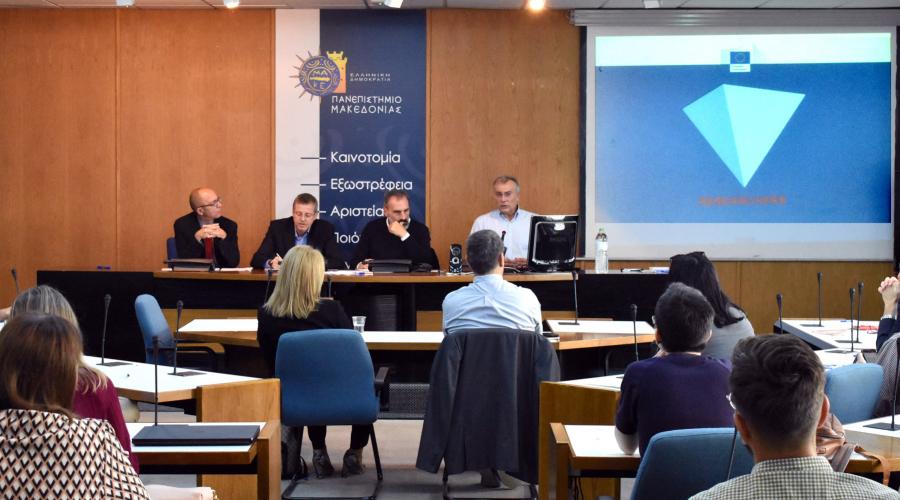
An informative workshop on ‘Research Ethics in the European Research Council (ERC) - Frontier Research Grants’ was held in Thessaloniki at the University of Macedonia on October 11 2019, by the Ethics Committee of Research, University of Macedonia, with the participation of the National Centre (EKT).
Which comes first in research, integrity or ethics? What is the methodology for including research projects in European funding programmes with presupposed rules and ethical principles? Do ethical rules and restrictions cause difficulties in the research project? Questions of this nature were raised and answered during the conference in which scientists and researchers from the universities of Thessaloniki and the university community participated.
The conference, dedicated to the memory of the President of Research, University of Macedonia Ethics Committee, Professor Vasiliki Karavakou, was opened by the Rector of the University of Macedonia, Professor Stylianos Katranidis, who, among other things, movingly talked about the late president’s personality and work before requesting a minute's silence in her memory.
The new President, Assistant Professor Ioannis Manos presented the Committee’s work and goals and the head of the Department of Research Ethics and Integrity at the European Commission Directorate General for Research and Innovation, Isidoros Karatzas, gave the key presentation entitled ‘Research Ethics and Integrity in Horizon 2020 and Horizon Europe’.

The second session of the workshop included a series of talks on the European Research Council programme (European Research Centre, ERC). Georgia Maziotis from EKT, the National Contact Point for ERC, presented a paper entitled ‘Submitted proposal structure, evaluation criteria, frequent mistakes and weaknesses’. After briefly presenting EKT support for Greek research teams submitting proposals to the ERC, G. Maziotis, focused on specific guidelines and examples which make proposals submitted for funding from the programme more robust and comprehensive.
Efthimios Tabouris Associate Professor at the University of Macedonia and evaluator of ethical issues in European programmes, talked about managing ethical issues in research proposals.
The workshop concluded with a presentation of two research proposals already approved by ERC, Professor Tania Valamoti’s Project: ‘Identifying the food cultures of ancient Europe: an interdisciplinary investigation of plant ingredients, culinary transformation and evolution through time – PLANTCULT’ and that of Alexandros Kiopkiolis, Associate Professor, Aristotle University of Thessaloniki ‘Refiguring the Common and the Political - HETEROPOLITICS’.
EKT, National Contact Point for ERC, Horizon 2020 programmes, provides a range of integrated services for the Greek research community. EKT personnel not only help Greek researchers to prepare their proposals and pursue funding, but also continues to support them in the implementation of their research.
As part of the EKT series of publications on Greek performance in Horizon 2020, it recently published a report on Greek participation in ERC programmes 2014-2018. During that period, funding was granted to 30 research projects which included the participation of 35 Greek organisations, primarily universities and research centres.







